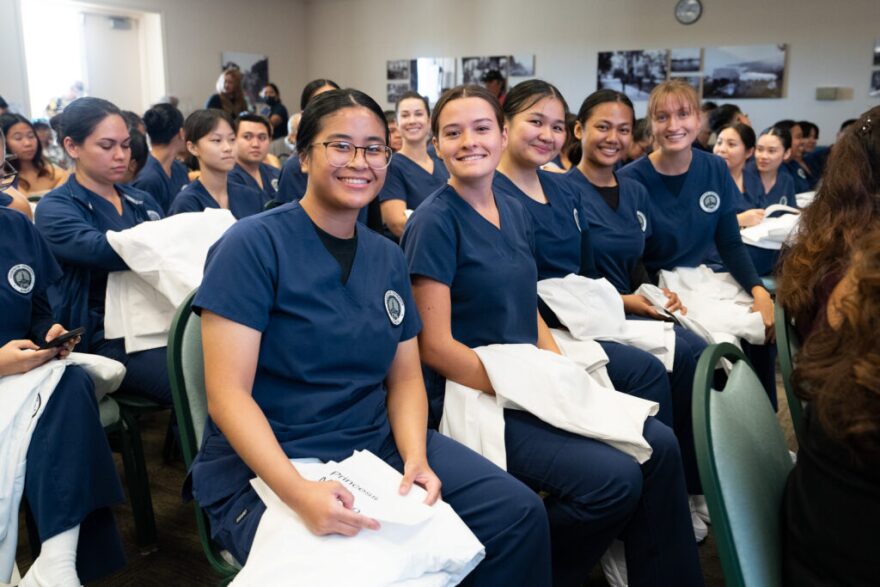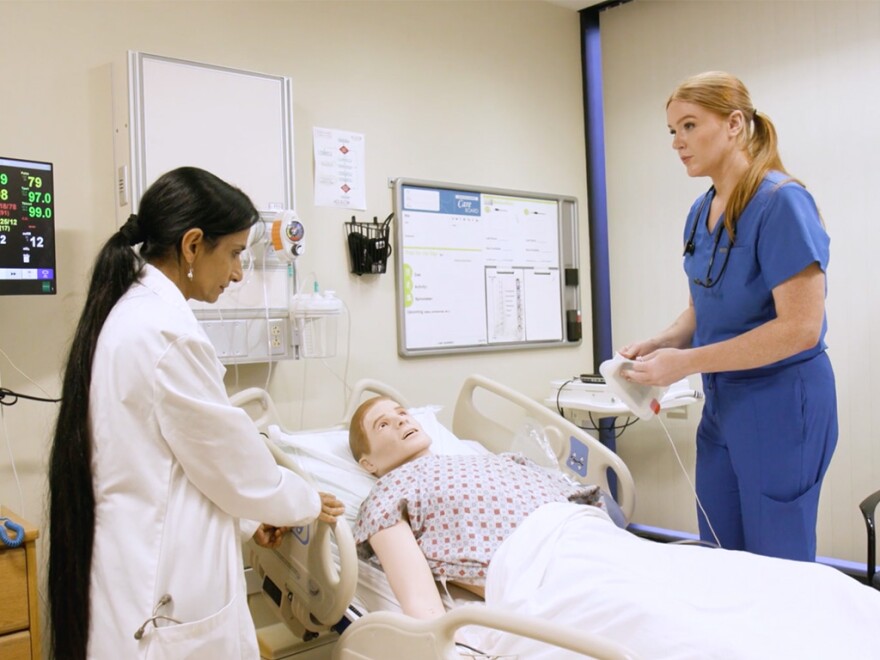The country is facing a nursing shortage, so some are questioning a move by the U.S. Department of Education to no longer consider nursing a professional degree. It’s one of eight programs — including teaching and architecture — that are no longer considered professional degrees.
The move will effectively cut the federal money available to help grow Hawaiʻi's pool of nurses.
The Conversation heard from two local programs that produce not just nurses but other health care workers who could be dropped from the professional degree list.
Chaminade University Dean of Nursing Lorin Ramocki and Hawaiʻi Pacific University Dean of Health Sciences Tricia Catalino expressed concern about reduced federal funding for certain health care professions.
Chaminade has one of the largest nursing programs in the state, with undergraduate enrollment between 350 and 400 students. Currently, the program has 55 nurses seeking advanced degrees.
Over at HPU, some 300 students are enrolled in its graduate nursing program. But other health care positions might be dropped from the list of professional degrees, including physician assistants and physical therapists.
Interview highlights
On reduced funding for nurses seeking degrees

LORIN RAMOCKI, CHAMINADE: We've really been following these changes here at Chaminade to help best understand any impacts that there might be for our students, community, the nursing profession as a whole. About 69% of post-baccalaureate students will utilize this type of federal funding. Graduate nursing programs provide advanced education for individuals who already hold a bachelor's degree and want to go on for advanced degrees. So these degrees prepare advanced practice nurses in critical roles to expanding health care, especially in underserved and rural communities, and they prepare at the master's and doctoral level.
On the specific federal loans
RAMOCKI: Recently, the Department of Education announced that it's moving forward with these changes that will have a direct impact on how graduate nursing students can borrow in federal loans. In July, there were two things that happened. So one, we had the elimination of the Federal Direct Graduate PLUS loan, and two, student loan caps that were put in place. So the Grad PLUS loans were the loans that helped cover the gap between the federal aid that would cover any remaining tuition. And while we were expecting that those might be eliminated, the hope was that nursing would be among the professions in the professional degree, in the loan cap tier system. So in this new ruling, there were two tiers. So one graduate programs in general were capped at $20,500 annually with a lifetime aggregate of $100,000, and then there was a second, higher tier that we were hoping that nursing would be included in, for professional programs, which had the higher limit of $50,000 and the annual lifetime limit of $200,000. And this is extremely important to us at Chaminade, but in nursing in general, because while the graduate nursing technically meets the definition of a professional degree program, it wasn't included in that ruling, so our students wouldn't be allowed to access those higher loan limits. So that's how it could really impact not only our university, but universities across the country, and ultimately the workforce there.

On opposition to the federal change
RAMOCKI: So one of the things that happens next is in the coming months, you'll really see a collaborative effort of nursing organizations, probably universities as well, and individuals advocating for their voices to be heard. That proposed ruling is expected to come sometime early in 2026, at which time a minimum of a 30-day period will open up where comments from the public can come in, and so that's really where our voices can be heard. So up until that time, you'll see a lot of things in the public with different surveys or petitions or things like that.
On concern for future students choosing not to pursue nursing degrees
TRICIA CATALINO, HPU: Our kuleana is to train the next generation of our health care workforce. So if we see further decreases of students going into these programs, the downstream affects our care for communities and patients at all stages of their life. So from keiki to kūpuna, right, these are people who go out and help folks live healthy, treat chronic conditions and rehab from injury, diseases, surgeries, anything like that. So without these people in our health care system, we can guarantee that our population is going to get sicker, not be able to do the things they want to do, the way they want to do them, if that makes sense. So yeah, deeply concerned about shortages and continued shortages to our health care workforce.
On programs at HPU at risk
CATALINO: We train doctors of physical therapy, doctors of occupational therapy, and physician assistants. And the individuals in each of these roles are professionals and have autonomy in their practice. So they are working in schools. They're working in communities, hospitals, rehab centers, in every stage of the health care continuum, alongside nurses and physicians, speech language pathologists, social workers, psychologists, and so it's the entire health care team that is at risk here.

On nursing shortages statewide
CATALINO: There are open positions pretty much in every sector of health care in Hawaiʻi, and oftentimes, hospitals, clinics, etc., have to rely on short-term contracts, or people traveling to our state to fill these needs, and often then, not able to stay long term. So you train folks, but they're not able to stay to continue care for patients in need in all of these locations. So year over year, we have annual reports on our workforce shortage in health care, and all of these professions have notably had shortages across the board. So something like this will continue that, or make it worse, to be honest.
Hawaii Nurses' Association President Rosalee Agas-Yuu said in a statement, in part: “The administration should be making pathways to these fields easier and more affordable because all Americans deserve fast access to quality healthcare from providers who are not overworked and exhausted."
This story aired on The Conversation on Nov. 25, 2025. The Conversation airs weekdays at 11 a.m. Hannah Kaʻiulani Coburn adapted this interview for the web.





